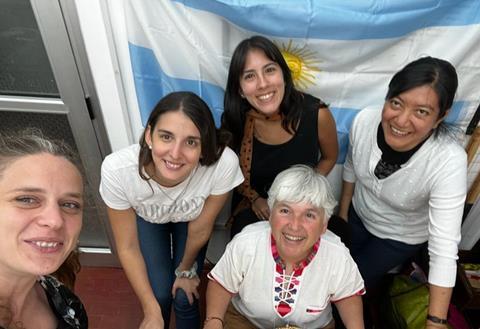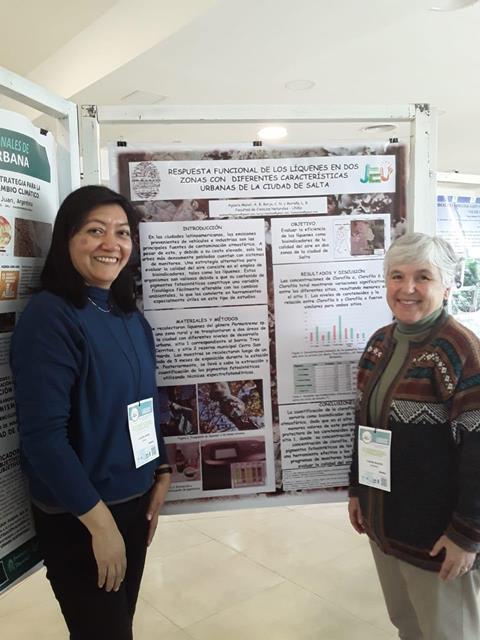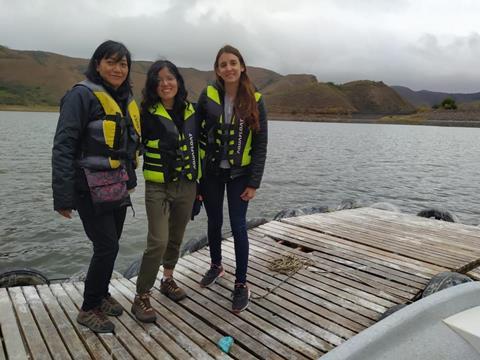The Water Quality Laboratory of the National University of Salta is situated in Salta Capital, in the northwest of Argentina.
Established in 1996 under the guidance of Dr. Mónica Salusso, and with the collaboration of Dr. Liliana Moraña, both esteemed professors and researchers at the university, this laboratory stands as the sole facility in the region dedicated to studies in limnology, surface water quality (including rivers, reservoirs, lakes, shallow lakes, and high-altitude wetlands), as well as environmental pollution and remediation.

It also plays a crucial role in the development of human resources, evident in the numerous undergraduate and postgraduate theses and scholarships conducted under the guidance of the laboratory’s experienced professionals.
New focus
In the early 2000s, Mg. Claudia Borja joined the laboratory as a professor, bringing with her a wealth of knowledge acquired through her undergraduate and master’s theses. She introduced a new research focus on lichens and air pollution.
In late 2016, Eng. Florencia Alvarez Dalinger became part of the team as a thesis student, eventually completing her doctoral thesis on two tropical reservoirs facing issues of toxic cyanobacterial blooms. Currently, she actively contributes to the laboratory’s endeavors as a CONICET (National Council for Scientific and Technical Research) fellow.

The laboratory welcomed Dr. Verónica Lozano and Lic. Camila Muñoz in 2020, with Dr. Lozano initiating a novel research line on the impact of pesticides in the environment. She currently serves as a CONICET researcher, directing Camila, a CONICET fellow, in her doctoral thesis.
Landmark moments
Some notable achievements of the laboratory include:
- Establishing the environmental baseline and monitoring the impact of mining on high-altitude saline wetlands in the Andean region, situated over 3,000 meters above sea level.
- Diagnosing the ecological integrity of water systems and categorizing the anthropogenic impact based on physicochemical and biotic indices.
- Demonstrating the relevance of climate change in the formation and persistence of toxic cyanobacterial blooms in tropical and subtropical basins of the region.
- Isolating native strains of algae and fungi and assessing their efficiency in laboratory-scale purification of regional pollutants.
- Collaborate on multidisciplinary projects within the Argentina Against Hunger program to ensure access to safe water for indigenous communities in Santa Victoria Este, Salta.
- Establishing an environmental awareness program through the offering of courses (undergraduate and postgraduate) and professional training, with over 40 students completing their theses in the laboratory.
- Currently, the laboratory is well-regarded in the province for consultancy collaborations with public and private management entities, aiding in the development of protocols related to water quality decision-making.

With the retirement of Mónica in 2021, the laboratory is currently composed of five members—Liliana, Claudia, Florencia, Verónica, and Camila. Each member pursues a specific research line, although collaboration occurs across all studies. Three of the five members are young researchers in training—Florencia, Verónica, and Camila.
Funding challenges
One of the ongoing challenges faced by the laboratory is securing research funding. Although lacking predetermined funding, the laboratory sustains itself through the services provided to third parties. These earnings are crucial for acquiring the necessary reagents and equipment to continue their valuable research. However, in recent years, conducting science, and especially being able to publish it in prestigious journals, is increasingly challenging due to reduced budgets.

In recent months, universities and CONICET have experienced budget cuts that jeopardize the continuity of the development of Argentine science and research, as well as the training of valuable human resources for our country. In 2023, CONICET ranked first among government institutions with the greatest social impact in Latin America (according to the Scimago ranking) and thirteenth out of 1747 government institutions worldwide, highlighting its importance. We express our deep concern about this situation, and we believe that Argentine science is vital for the progress, innovation, and sustainable development of the country, consolidating our sovereignty.
Topics
- Algae
- Applied Microbiology International
- Camila Muñoz
- Claudia Borja
- Clean Water
- Climate Action
- Community
- CONICET
- Environmental Microbiology
- Florencia Alvarez Dalinger
- Fungi
- Healthy Land
- Lab Spotlight
- Liliana Moraña
- Mónica Salusso
- National University of Salta
- Sample preparation, filtration, detection and treatment techniques for water-borne pathogens
- The Americas
- Verónica Lozano







No comments yet